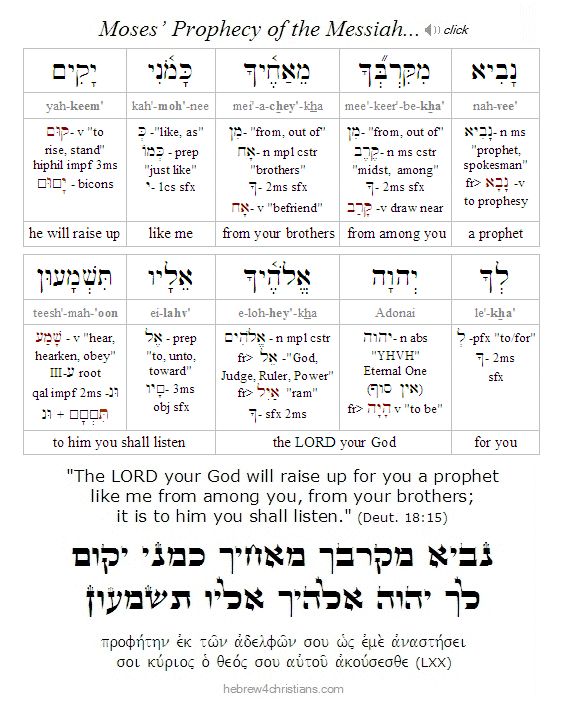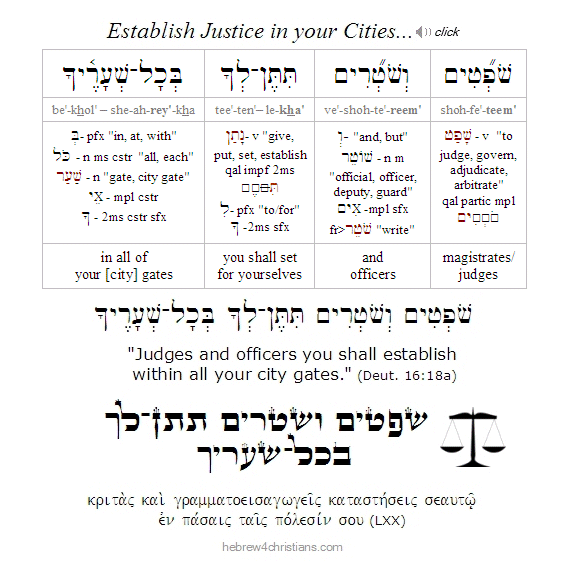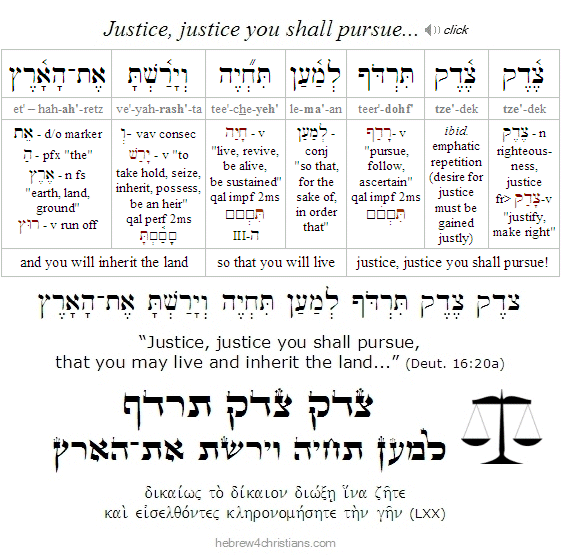|
|
 |
 |
 |
 |
|
Weekly Torah Reading
|
|
|
|
Parashat Shoftim ("Judges")
|
|
|
Click on the links to display the Scriptures:
|
|
|
|
 |
 |
 |
|
Torah Reading Overview
|
|
|
|
Parashat Shoftim begins with the commandment that the people of Israel should appoint judges (i.e., shoftim: שׁפְטִים) and officers (i.e., shoterim: שׁוֹטְרִים) in all the walled cities alloted to the tribes, so that justice would be enforced throughout the promised land. These judges were to be above reproach, neither showing partiality nor accepting bribes on behalf of the wealthy: "Justice, justice shall you pursue, that you may live and possess the land the Lord your God is giving you." In practical terms this meant that every town in Israel was to have its own law court with a police force to enforce the decision of the appointed judges.
|
|
|
 |
 |
|
Judges at the Gate
|
 |
 |
|
Moses commanded the Israelites to enforce theocratic law in every Jewish city of the Promised Land. Shofetim (judges) were to be appointed in every city to decide cases of civil, domestic, and even religious controversies. These judges were to act with mishpat (justice) and tzedakah (righteousness) and were to be entirely impartial in their findings. Moreover, the shofetim were vested with executive powers of state, so that they directed the enforcement of judicial matters (by means of the services of the shoterim, the police of ancient Israel). The idea of shofetim derived Yitro's advice to appoint a hierarchy of sarim (princes) over the people just after the Exodus from Egypt (Exod. 18:19-26).
Among other things, this meant that every town in Israel was to have its own Bet Din (law court or "house of judgment") with its own shoterim (police force). In smaller towns, a Bet Din was to have no less than three judges to render binding decisions; in larger towns 23 were required. (Later in Jerusalem, the Sanhedrin, a group of 70 shofetim and a nassi (leader) formed the Supreme Court of the nation. The idea of the Sanhedrin goes back to the 70 zekanim (elders) who ate the covenant affirmation meal at Sinai with Moses).
In ancient walled cities, the city gate (sha'ar) was the place of most traffic, and the visible presence of shofetim and shoterim there was meant to indicate to fellow Jews that the town was a lawful and God honoring place.
Prohibitions again idolatrous forms of worship (e.g., Asherah trees and matzeivah - stone monuments or idolatrous pillars), and the prohibition of offering blemished (mum) animals to the LORD follow these commandments to establish justice in the land.
Idolatry (avodah zarah) is to be punished by death by stoning (sekilah), but a conviction must be established on the testimony of two or more witnesses (not merely one). "The hand of the witnesses shall be first against him to put him to death, and afterward the hand of all the people."
If a local Bet Din finds a case too difficult to decide, it was to be referred to a higher authority (i.e., the supreme court of the priests at the Sanctuary) whose decision was considered final. The courts and judges are hereby invested with the authority to interpret and decide all matters of Torah case law (halakhah).
|
 |
 |
 |
|
Appointing a King
|
|
|
|
Moses foresaw that a time would come when the people would desire a king to rule over them, as did other nations. When this occurred, the king was to be an Israelite chosen by the LORD who was not to misuse his powers to amass many horses, maintain a harem or accumulate great wealth. He was to personally write a letter-perfect copy of the Torah that was to be verified by the priests, so that he would be God-fearing and Torah observant during his entire reign.
In this connection, Moses then waxed prophetic and spoke of the coming Messiah - the true and rightful Melekh Yisrael (King of Israel).
|
|
|
Moses Foretells the Messiah...
|
|
 |
 |
|
|
נָבִיא מִקִּרְבְּךָ מֵאַחֶיךָ כָּמנִי
יָקִים לְךָ יְהוָה אֱלהֶיךָ אֵלָיו תִּשְׁמָעוּן
nah·vee mee·keer·be·kha mei·a·chey'·kha kah·moh'·nee
yah·keem le·kha Adonai E·loh·hey'·kha: ei·lahv teesh·mah·oon

"The LORD your God will raise up for you a prophet like me from among you,
from your brothers -- it is to him you shall listen"
(Deut. 18:15)

In this parashah we find the only passage in the entire Torah where Moses explicitly identified himself as a prophet of the LORD. Moreover, this is also the only passage where Moses identified the coming of the Messiah as "a Prophet like me" (Deut 18:15; cp. John 6:14). Notice further that the coming prophet must be Jewish ("from your brothers") so the entire premise of Islam on this question is wrong.
In the New Testament we read that the soferim (scribes) had sent a delegation to question Yochanon the Immerser (John the Baptist), asking him two questions:
- "Are you Elijah?" (John 1:21) - This referred to Malachi's prophecy (Mal. 4:5) that Elijah would come as a messenger before the appearance of the Messiah. To this day Jews around the world still set out a cup of wine for Elijah at Passover - in anticipation of his arrival as the forerunner of the Messiah.
- "Are you the Prophet?" (John 1:21). This referred to Moses' prophecy that God would send "a Prophet like me" (Deut. 18:15-19).
We further read that when Philip encountered Nathanael, he said, "We have found Him of whom Moses in the law, and also the prophets, wrote - Yeshua minetzaret ben Yosef (Jesus of Nazareth, the son of Joseph)" (John 1:45). After Yeshua fed the five thousand, the people began to ask if this was "the Prophet who is to come into the world" (John 6:14). Peter identified Yeshua as the Prophet (Acts 3:22-23), and in his apologetic before the Sanhedrin, Stephen the martyr declared that Yeshua was the promised Messiah: "This is that Moses who said to the children of Israel, 'The lord your God will raise up for you a Prophet like me from your brethren. Him you shall hear.'" (Acts 7:37-38).
Yeshua is the "Prophet Like Unto Moses"
In light of these passages of Scripture, here are thirty (30) ways in which Yeshua minetzeret ben Yosef indeed resembled Moses:
- Just as there were 400 years of silence before Adonai sent Moses to deliver Israel from her bondage to Pharaoh, so there were 400 of years of silence before Adonai sent His own Son, Yeshua the Messiah, to utterly deliver Israel from her ultimate bondage to sin and death.
- Both Moses and Yeshua were sent from God (Exod. 3:1-10; John 8:42).
- Both Moses and Yeshua were Jews (Exod. 2:1-2; Matt. 1:1-16; Luke 1-2; Heb. 7:14). (Note: This is no small thing, since Muslims claim that Muhammad is the prophet Moses referred to here; which is obviously incorrect, since the Messiah must be a Jew, "from among your brothers" - see John 4:24).
- Both had faithful Jewish parents (Exod. 2:2; Heb. 11:23; Matt. 2:13-14).
- Both were born under foreign rule (Exod. 1:8-14; Luke 2:1).
- Both were threatened by wicked kings (Exod. 1:15-16; Matt. 2:16).
- Both Moses and Yeshua spent their early years in Egypt, miraculously protected from those who sought their lives (Exod. 2:10; Matt. 2:14-15).
- Both rejected the possibility to become rulers in this age. Moses was raised as a son in the royal family and could have enjoyed a lavish lifestyle as a powerful ruler, but he chose differently (Heb. 11:24); Satan offered Yeshua the rule over the kingdoms of this world (Matt. 4:8-9), but rejected that offer and chose to suffer and die for the sake of the people of Israel.
- Both Moses and Yeshua were "sent from a mountain of God" to free Israel. Moses was sent from (physical) Mount Sinai in Midian, Arabia; Yeshua was sent from a spiritual "Mount Zion" in Heaven (Heb. 12:22).
- Both were initially rejected by the Jews (Exod. 32:1; Isa. 53: 3; Matt. 27:21-2;
Rom. 11:25).
- Both were accepted by Gentiles (Moses by the Midianites (Exod. 2:14-22); Yeshua by the world (Acts 10:45; 1 Tim. 3:16)).
- Both were criticized by their families (Num. 12:1; Mark 3:20-21).
- Both knew God panim el panim (face to face). God spoke directly to both Moses and Yeshua (Exod. 3:1-10; Deut. 34:10; Luke 9:34-36). All other prophets received their revelation by visions or dreams (Deut. 34:10; John 1:18). Both were authoritative spokesmen for God (Matt. 17:5; John 3:34).
- Both were teachers (Deut. 4:1-5; Matt. 22:16; John 3:2).
- Both revealed God's Name (Exod. 3:13-14; John 17:6, 11-12).
- Both were faithful to God (Num. 12:5-7; Heb. 3:1-2).
- Both gave the people bread from Heaven (Exod. 16:14-15; Matt. 14:19-20) and performed various miracles (Exod. 4:21-8; Deut. 34:10-12; John 5:36; 12:37-8).
- Both were appointed as saviors of Israel (Moses as Israel's deliverer from the bondage to Pharaoh; Yeshua as Israel's deliverer from the bondage to Satan).
- Both were shepherds of Israel (Moses led the Israelites through the wilderness (Exod. 3:1; Numbers), Yeshua led His followers as the Good Shepherd (John 10:10-11; Matt. 9:36)).
- Both were humble servants of the LORD (Num. 12:3; Luke 2:46-7; Phil. 2:8-9).
- Both fasted for forty days in the wilderness (Exod. 34:28; Matt. 4:2).
- Both were Mediators of a covenant of blood: Moses of the older covenant (Exod. 24:7-8) and Yeshua of the new covenant (Matt. 26:26-28; Mark 14:24; Luke 22:20; Heb. 9:11-15; 1 Cor. 11:25; 2 Cor. 3:6).
- Both offered to die on behalf of the people's sins (Exod. 32:30-33; John 17).
- Just as Moses instituted the LORD's Passover on Nisan 14 as the means by which the Angel of death would pass over those Israelites who trusted in God's promise regarding the blood of the lamb (Exod. 12:11-12), so Yeshua offered Himself as the sacrificial Lamb of God who takes away the sins of the world (John 1:29).
- Just as Moses brought about the "resurrection" of the children of Israel as they passed through the Red Sea; so Yeshua became the Firstfruits of resurrection as He rose from the dead.
- Just as the Torah was given to Israel fifty days after the Exodus from Egypt (on Pentecost or Shavuot), so Yeshua sent the Holy Spirit to form the Church fifty days after His resurrection.
- Both of their faces shone with the glory of heaven - Moses on Mount Sinai (Exod. 34:34-5) and Yeshua on the Mount of Transfiguration (Matt. 17:2).
- As Moses lifted up the brazen serpent in the wilderness to heal his people (Num. 21:8-9); so Yeshua was lifted up on the cross to heal all believers from their sin (John 12:32).
- As Moses conquered the great enemy of Israel, the Amalekites with his upraised arms (Exod. 17:11), so Yeshua conquered our ultimate enemy of sin and death by His upraised arms on the cross (John 19:18).
- As Moses sent twelve spies to explore Canaan (Num. 13), so Yeshua sent twelve apostles to reach the world (Matt. 10:1); and as Moses appointed seventy rulers over Israel (Num. 11:16-7), so Yeshua anointed seventy disciples to teach the nations (Luke 10:1).
So how was Jesus (i.e., Yeshua) a Prophet like Moses? Like Moses, He was a Jew, a Leader, a Prophet, a Lawgiver, a Savior, a Teacher, a Priest, an Anointed One, a Mediator between God and man -- speaking the words of God -- and like Moses, He offered himself to die for the sins of the people...
The Parashah (continued)
After Moses gave his prophecy concerning the coming Prophet, he repeated some of the people's duties toward the Kohanim (priests) and the Levites, including the gifts set aside from the farmer's produce, shearings and slaughtered cattle (terumah); the prohibitions against various forms of sorcery and superstitions, the duty to obey the prophet, and the requirement to set aside of "Cities of Refuge" for someone who kills unintentionally. In addition, many of the rules of war are given, including the prohibition against wanton destruction of something of value (i.e., bal tashchit: בַּל תַּשְׁחִית), as exemplified by the law that forbids cutting down a fruit tree when laying siege.
The portion concludes with the law of Eglah Arufah - a special procedure to be followed when a person is killed by an unknown murderer and his body is found in a field. In such a case, responsibility for the murder rested with the city nearest to the scene of the murder. In an atonement ceremony, the leaders of the city were to slaughter a young heifer, wash their hands in the priest's presence, and pray for forgiveness.
Note: A more detailed study of this portion is found in the Shabbat Table Talk, below...
|
|
 |
 |
|
 |
 |
|
 |
|
|
|
Haftarah Reading Overview
|
|
|
|
The Haftarah for Shoftim is called the fourth of the "Haftarot of Consolation," offering encouragement to Israel even in the face of exile.
אָנכִי אָנכִי הוּא מְנַחֶמְכֶם
מִי־אַתְּ וַתִּירְאִי מֵאֱנוֹשׁ יָמוּת
וּמִבֶּן־אָדָם חָצִיר יִנָּתֵן
וַתִּשְׁכַּח יְהוָה עֹשֶׂךָ
נוֹטֶה שָׁמַיִם וְיֹסֵד אָרֶץ
ah·noh·khee · ah·noh·khee · hoo · me·na·chem·khem
mee-at · va'·teer·ee · mei'·e·nohsh · yah·moot
oo'·mee'·ben-ah·dahm · chah·tzeer · yee·nah·tein?
va'·teesh'·kach · Adonai · oh·se'·kha
noh·teh · shah·ma'·yeem · ve'·yoh·seid · ah'·retz

"I, I am he who comforts you; who are you that you are afraid
of man who dies, of the son of man who is made like grass,
and have forgotten the LORD, your Maker,
who stretched out the heavens and laid the foundations of the earth?"
(Isa. 51:12-13)
|
 |
 |
|
How beautiful upon the mountains are the feet of him who brings good news, who publishes peace, who brings good news of happiness, who publishes salvation, who says to Zion, "Your God reigns" (Isaiah 52:7).
After the great Tribulation, Israel will finally receive the Mashiach Yeshua, and the salvation of Israel will be evident to all the world. Some of the Jewish sages have said that the reference to the "feet" of the messenger has to do with the reinstitution of the "Shalosh Regalim," the three major Pilgrim festivals, Pesach, Shavuot and Sukkot, when the Jewish people would travel on the hills of Jerusalem to the Temple to worship the LORD. At any rate, when the LORD returns to Jerusalem and all Israel is saved, all of the mo'edim will clearly reveal how Yeshua is the fulfillment of their comfort and their salvation.
|
 |
 |
|
The passage from the gospel of John recalls the two questions the soferim (scribes) asked John the Baptist:
- "Are you Elijah?" (John 1:21) - This referred to Malachi's prophecy (Mal. 4:5) that Elijah would come as a messenger before the appearance of the Messiah. To this day Jews around the world still set out a cup of wine for Elijah at Passover - in anticipation of the his arrival as the forerunner of the Messiah.
- "Are you the Prophet?" (John 1:21). This referred to Moses' prophecy that God would send "a Prophet like me" (Deut. 18:15-19).
John's answer was that he was a "voice of one crying out in the wilderness" (Isa. 40:3) sent to bear witness to the Mashiach Yeshua, who was presently in their midst.
The passage from the Book of Acts recalls the Apostle Peter's message given at Solomon's portico where he quoted Deuteronomy 18:18-19 and identified Yeshua as the Prophet like unto Moses.
Blessing:
|
|
|
 |
 |
|
Related Discussion:
|
|
|
|
 |
 |
|
Hebrew Audio Files:
|
|
 |
 |
|
Click the following links to hear the desired chapters read from this week's Torah:
|
|






